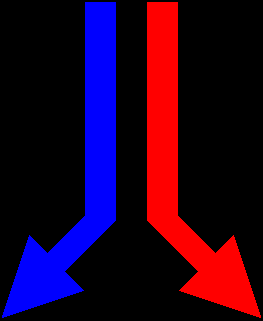
Clash Of The Prophets
We are fast approaching a season where this new prophetic divergence will cause a much greater distinction or separation between the two camps (those who are truly prophetic and those who are false), culminating in greater conflict, confrontation and contention among the prophets.
Then it happened, when Ahab saw Elijah, that Ahab said to him, “Is that you, O troubler of Israel?” And he answered, “I have not troubled Israel, but you and your father’s house have, in that you have forsaken the commandments of the Lord and have followed the Baals. Now therefore, send and gather all Israel to me on Mount Carmel, the four hundred and fifty prophets of Baal, and the four hundred prophets of Asherah, who eat at Jezebel’s table.” So Ahab sent for all the children of Israel, and gathered the prophets together on Mount Carmel. And Elijah came to all the people, and said, “How long will you falter between two opinions? If the Lord is God, follow Him; but if Baal, follow him.” But the people answered him not a word (1 Kings 18:17-21).
Most Christians are familiar with this story of Elijah’s contest with the false prophets of Baal; however, I don’t believe that many of us have been able to truly grasp the magnitude of this particular event. This wasn’t just some contest between a true prophet of God and some “television psychics” like some have made it out to be. Without venturing too deeply into the subject of Baal and all that its worship entailed, let me provide a brief backdrop or context for the events unfolding above.
Baal, which basically means Lord or Master, represents a false and idolatrous system of worship that continued to be a thorn in Israel’s side throughout her existence. Baal’s influence upon the nation can arguably be seen as early as the exodus from Egypt (Ex. 32), but its official entrance into the nation and contamination of their worship was at Peor during their sojourn in the Acacia (Shittim) grove (Num. 25:1-3; Josh 22:17). Incidentally, this false and iniquitous pattern or structure, which later became a stronghold in Israel, was built upon the ministry and counsel of Balaam (Num. 31:16).
So here we have an iniquitous structure being built and established among the people of Israel by the accurate prophesier Balaam. His false pattern and design outlives him for many generations and is reintroduced into the nation through Jezebel. Considering the fact that almost the entire nation was deceived by this false, iniquitous system of worship, we have to conclude that this was not as blatantly apparent as we had previously assumed, but that there was a subtle syncretism that took place over a period of time (sort of like the slow heating until boil with the frog in the pan effect) until it had enveloped the nation.
What this suggests is that the priests and spiritual leaders of the nation had all (at the very least most) succumb to Baal’s influence. Most of the prophets had either been corrupted or killed at the hands of Jezebel, which is why Elijah was led to believe that he was the only true prophet left (1 Kings 19:14). In the meantime, Jezebel was careful to give favor and support to those prophets who had become accommodating to her cause and had ascribed to this false pattern of worship. There is no indication that these were prophets who were brought in from outside of Israel or were somehow imported from Canaan. These prophets of Baal and Asherah were men of Israel (probably former priests and prophets of God) who had become corrupted by this false order.
When you begin to study what this false god, Baal, and his female counterpart, Asherah, represent, you begin to understand how it is that Israel was so easily seduced time and time again into adopting this false system of worship through syncretism.
Both Baal and Asherah were known and worshiped as fertility gods. While Baal was primarily associated with the sun and the productive forces of nature such as the rain; his worship, and particularly that of Asherah, included great sensuality, licentiousness and sexual deviance. Baal may have been used as a generic term for god amongst the ancient people of Canaan and the surrounding territories, but it unquestionably represents a false, religious system of worship that places great emphasis on blessing (fertility – the ability to produce/supply; sun/rain symbolic of blessing), personal gratification and self-indulgence (including lust and all forms of sexual perversion).
This type of distortion, of course, is very common today and is the driving force for every single one of this world’s religions, including Christianity. Not only is this “bless me”, self-centered mentality where we make God to be our personal “sugar daddy” (Baal) contrary to what the apostle James described as “pure religion” (which is selfless and focuses upon the needs of others rather than your own), but it is antithetical to the true Kingdom model God intended to be portrayed through the nation of Israel and His Ecclesia – the Church (Mrk. 10:21-23; Jam. 1:27).
Obviously, because the “bless me” model caters to our flesh and is perpetuated through a false system of worship that is based upon our self-indulgence, it has a very high appeal which makes it a very popular worship model. You can now understand why it became such a constant stumbling block to Israel, and why an entire nation would succumb to its evil influence. It was, after all, a very popular religion.
Any prophet who dared challenge, criticize or speak out against this corrupt system of worship was immediately ostracized and condemned. The true prophetic dimension became unpopular and was displaced by a corrupt company of prophets who were favorable to Baal and served to promote this false system of worship in Israel. This was the situation in which Elijah now found himself. He had arisen to challenge the prevailing religious beliefs though being vastly outnumbered (remember; truth is not necessarily found in the majority, and true prophets are frequently in the minority), because those who should have stood with him were either already dead (cut off or stripped of their power and influence) or were hiding and cowering with fear (1 Kings 18:4, 22).
The whole point of the contest was to prove the superiority of God over Baal, and to a lesser degree, the superiority of the true prophetic dimension over the false one which, by the way, often relied upon various forms of divination for their oracular emissions (1 Kings 18: 28-29, 36). The particular divergence between these two companies had matured or deepened to the point of violent conflict. There could be no coexistence between the two. One would be destroyed by the other, and to the victor would go the spoils – the entire nation!
Lest anyone is tempted to go away from this article thinking that we are somehow espousing physical aggression or violence against those false prophets who are deeply entrenched in an idolatrous system of apostasy, let me clarify that what the true prophets are contending against is not the people but the false system that they seek to promote or represent. This false system of Baal and Jezebel is at war against the true prophetic spirit, and it will stop at nothing until this spirit is destroyed. Conversely, the true prophetic spirit is also at war against this false or counterfeit prophetic dimension, and the primary battle is one of bringing greater sightedness and connectedness with the One True God.
Beyond the obvious issue of supernatural manifestation and whose God had the power to visibly answer by fire was a significant message in this battle. The main statement Elijah was trying to make through this contest was not so much about manifestation as it was about validation (1 Kings 18:24). In Scripture, whenever there was a release of fire from heaven, it usually communicated either divine judgment or divine approval (Lev. 9:24; 10:2; Num. 11:1; 16:35; 1 Chron. 21:26; 2 Chron. 7:1).
When the false prophets failed to invoke a supernatural manifestation of fire from heaven and Elijah succeeded most convincingly, it served to validate or confirm the authenticity of his prophetic ministry. God was basically putting His stamp of approval upon Elijah’s prophetic activity, while at the same time invalidating and rejecting the prophets of Baal and Asherah. You have to remember that an entire nation was hanging in the balance with regard to this contest, because most of them were still undecided as to which was the accurate prophetic company and whose God was the real God. One was correct and one was not, so by releasing His Holy fire from Heaven God was making known to the nation that Elijah was truly His servant and that He was operating from a position of correctness. In fact, if you read the story you will realize that not only did the fire of God fall and consume the sacrifice, but it consumed the entire altar that he had built as well, including the water that had been poured upon it (1 Kings 18:25-39). In other words, God was saying that not only was the sacrifice correct, which represents Elijah, but that what he had built was correct and accurate as well, thus indicating a true prophetic dimension.
The false prophets of Baal, on the other hand, were exposed as imposters. The primary issue was not their impotence, but their inaccuracy (of spirit, character and building architecture). They received no heavenly endorsement, which led to their demise.
And Elijah said to them, “Seize the prophets of Baal! Do not let one of them escape!” So they seized them; and Elijah brought them down to the Brook Kishon and executed them there (1 Kings 18:40).
Elijah did not show any mercy to this false company of prophets, but executed the vengeance and the judgment of God upon them. This is the same attitude and mentality that the true prophetic community must take against this false and corrupt order of prophets that would seek to promote the worship of Baal among us. We must execute the judgment of God thoroughly upon this false system. The spirit of Elijah must not be hidden away in the cave of compromise, cowardice or complacency, but must boldly confront and condemn the prophets of Baal who occupy high and lofty positions at Jezebel’s table. When the true spirit of Elijah emerges in this spiritual battle, it will release a prophetic sound that empowers people to see and to seize that which is inaccurate or false so that Baal’s influence is diminished and destroyed.

Leave A Comment